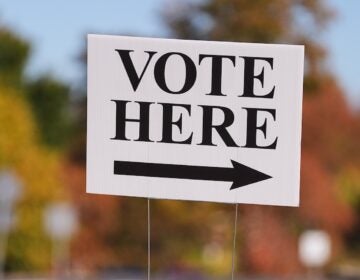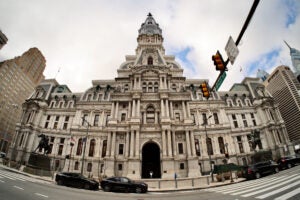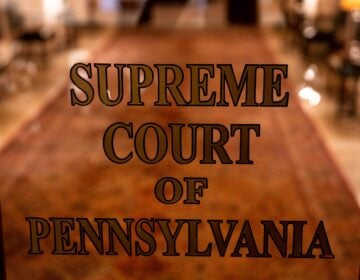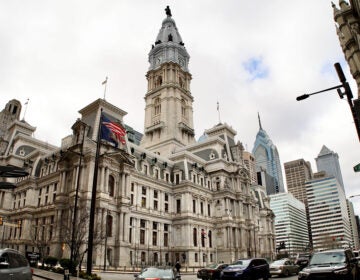Pennsylvania voters choose to retain state Supreme Court justices
Republicans, including President Donald Trump, had pushed voters to out the three justices as what has been a historically quiet race gained national attention.
Listen 0:53
From left to right: Pennsylvania Supreme Court Justices David Wecht, Christine Donohue and Kevin Dougherty. (AP)
Pennsylvania residents had the opportunity to vote in local and statewide judicial elections, from municipal judges all the way up to the Pennsylvania Supreme Court. While such off-year elections have traditionally been low-key, this year proved to be different with millions of dollars going into the Supreme Court retention race which, in turn, brought an unusual level of attention to the other judicial races, as well.
Here are the results.
Supreme Court
Pennsylvania voters answered “yes” to the retention of Justices Christine Donohue, Kevin M. Dougherty and David N. Wecht on the state’s highest court, preserving the 5-2 Democratic-elected majority on the Supreme Court of Pennsylvania.
The results mark a decisive moment for the judicial branch in the commonwealth, following a year of unprecedented attention — and expenditures — on what has traditionally been a low-profile process of judicial retention.
By giving each justice another 10-year term on the bench, voters effectively rejected efforts to alter the ideological composition of the court. The Democratic-elected majority remains intact, limiting the prospect of a partisan shift in key decisions in years to come.
Although retention elections in Pennsylvania are nonpartisan in name — voters mark “yes” or “no” without party affiliation — this year’s fight took on a strikingly partisan cast. The three justices had originally been elected as Democrats in 2015 and have since issued rulings on major — albeit divisive — issues, including abortion access, voting rules, electoral maps and COVID restrictions.
Republicans and right-wing activists blasted those decisions and sought to take advantage of the rare opportunity to change the overall direction of the court by mounting an unprecedented effort to get Wecht, Donohue and Dougherty removed from their benches, which also prompted Democrats to get more involved than in the past.
The scale of campaign spending also soared, underscoring how state courts are increasingly battlegrounds for broader political disputes.
“I got mailers every other day in my mailbox and I saw quite a few ads on TV,” South Philly resident Deborah Dalton said just after she voted.
However, she told WHYY News that the current politics in Washington, D.C., led her to vote to retain all three justices.
“We have enough crap going on every other day,” she said. “You don’t know what’s going on on that national level. I want some consistency here in Philadelphia.”
Prior to the vote, analysts also warned that the court could face a 2-2 partisan deadlock if the three justices failed to win retention and if the governor and Legislature were unable to agree on interim appointments. With the retention secured, that scenario has been avoided, at least for the foreseeable future.
Only two of the three justices are guaranteed to serve another 10-year term, however, as Donohue is due for mandatory retirement in two years when she will reach the age of 75, which will prompt another election.
Commonwealth Court
In the race to fill one open seat on the Commonwealth Court of Pennsylvania, voters selected Judge Stella Tsai, a Democrat and longtime member of the Philadelphia Court of Common Pleas. Her win preserves a path for Democrats to maintain influence on one of the state’s two intermediate appellate courts.
The Commonwealth Court handles appeals and original jurisdiction cases involving state and local governments, regulatory agencies and election matters, making it a consequential institution for how governance and public-policy disputes are resolved in the commonwealth.
Tsai, born in Harrisburg to immigrant parents from Taiwan, graduated from the University of Pennsylvania and Penn Law, and has served as a judge of the Philadelphia Court of Common Pleas since 2016. She told WHYY News before the election that her background helped mold her desire to become a lawyer and then a judge.
“As a child of immigrants who came from a country that was ruled by a pretty repressive regime that imposed martial law in 1997, I understood the importance of democracy at an early age,” she said. “And because of that, a lot of my life has been devoted to the issue of voting rights and free and fair elections and making sure that people have the opportunity to participate in this democracy.”
Voters also retained Judge Michael Wojcik, a Democrat who has served on the Commonwealth Court since 2016 and will now serve another 10-year term. Despite their wins, judges elected as Republicans will continue to hold a majority on the court, now 5 to 4.
Superior Court
Democratic Judge Brandon P. Neuman secured victory to fill the open 10-year term on the Superior Court of Pennsylvania. His win marks a modest but meaningful shift in the 15-member appellate bench, which plays a key role in civil, criminal and family law appeals across the commonwealth.
The seat became vacant after former Judge Daniel D. McCaffery ascended to the state Supreme Court in 2023. In the general election, Neuman faced Republican nominee Maria Battista and Liberal Party candidate Daniel Wassmer.
Democrat Judge Alice Beck DuBow also secured a new 10-year term in a separate retention vote.
The Superior Court hears most appeals from the 67 county courts, setting the tone for how law is applied across the state. Neuman’s victory strengthens the Democratic presence on the court, which currently includes eight judges originally elected as Democrats and six originally elected as Republicans. With this win, the partisan balance tilts further in the Democratic direction — a development likely to resonate in cases involving election law and criminal justice reform.
Philadelphia judges
Philadelphia voters completed what had been a largely uncontested judicial cycle: 11 open seats on the Court of Common Pleas and four open seats on the Philadelphia Municipal Court were filled, and all candidates on the Democratic slate prevailed. The outcome affirms the city’s one-party dominance of the bench and underscores how judicial elections in the city continue to be shaped by internal Democratic Party processes rather than competitive partisan battles.
City voters were asked to select 11 new judges to the Court of Common Pleas to fill an equal number of open seats, alongside 13 sitting judges standing for retention. All 11 candidates running for the open seats were Democrats, and each carried the endorsements of the local Democratic Party and the Philadelphia Bar Association, per the voter guide. The slate included Larry Farnese, Kia Ghee, Leon A. King II, Will Braveman, Brian Kisielewski, Irina Ehrlich, Anthony Stefanski, Deborah Watson‑Stokes, Sarah Jones, Joseph J. Russo and Jennifer A. Santiago.
On the Municipal Court side, the four open seats were won by the only four candidates, Democrats Amanda Davidson, Michael Parkinson, Sherrie Cohen and Cortez Patton.
All of the judges running for reelection were also retained.
 This story is a part of Every Voice, Every Vote, a collaborative project managed by The Lenfest Institute for Journalism. The William Penn Foundation provides lead support for Every Voice, Every Vote in 2024 and 2025 with additional funding from The Lenfest Institute for Journalism, Comcast NBC Universal, The John S. and James L. Knight Foundation, Henry L. Kimelman Family Foundation, Judy and Peter Leone, Arctos Foundation, Wyncote Foundation, 25th Century Foundation, and Dolfinger-McMahon Foundation.
This story is a part of Every Voice, Every Vote, a collaborative project managed by The Lenfest Institute for Journalism. The William Penn Foundation provides lead support for Every Voice, Every Vote in 2024 and 2025 with additional funding from The Lenfest Institute for Journalism, Comcast NBC Universal, The John S. and James L. Knight Foundation, Henry L. Kimelman Family Foundation, Judy and Peter Leone, Arctos Foundation, Wyncote Foundation, 25th Century Foundation, and Dolfinger-McMahon Foundation.
To learn more about the project and view a full list of supporters, visit www.everyvoice-everyvote.org. Editorial content is created independently of the project’s donors.

Get daily updates from WHYY News!
WHYY is your source for fact-based, in-depth journalism and information. As a nonprofit organization, we rely on financial support from readers like you. Please give today.








